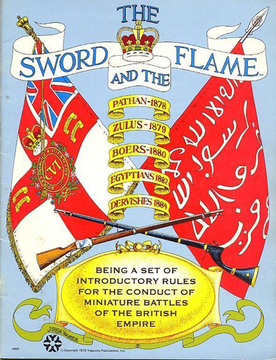The Sword and The Flame
|
The Sword and the Flame (1979) by Yaquinto
|
|
| Designer(s) | Larry V. Brom |
|---|---|
| Publisher(s) | And That's The Way It Was..., Yaquinto Publications |
| Publication date | 1988, 1979 |
| Genre(s) | British colonial wars |
| Players | 2+ |
| Setup time | 30+ minutes |
| Playing time | 60–120 minutes |
| Random chance | Medium |
| Skill(s) required | Strategic thought |
The Sword and The Flame is a wargame based on British colonial wars (in particular, the Anglo-Zulu War) and, more generally, a set of rules applied to a variety of wargames.
These rules for playing colonial wargames were first drafted by Larry Brom in 1978. The rules have gone through several revisions, but still have the same basic characteristics that they had when first written.
When Larry drafted the original set of The Sword and The Flame rules (usually referred to as TSATF) he had 5 main objectives. These were:
The rules included some interesting innovations, particularly the use of playing cards to randomise movement and firing (Larry refers to this as the 'random move card innovation'). At a time when movement and firing was either alternate ('you move, I move') or simultaneous, this represented a major change in thinking amongst wargamers.
In 1979, Yaquinto Publications released Supplement 1, which went along with their edition of the game. This first variant included answers to frequently asked questions, optional rules and three alternate gaming periods, including: The Boxer Rebellion, French and Indian War, and French Foreign Legion periods.
The rules have proven so popular that they have generated a whole set of variants which adapt the rules from their original British colonial (and especially Anglo-Zulu War) focus to other historical periods; the names of the variants usually incorporate the words "the Sword", although the variant that simulates the establishment of the White Rajahs in Sarawak is called The Kris And The Flame. A fantasy wargame variant Awaken The Storm! was released in 2007.
The title is derived from The Widow at Windsor, a poem by Rudyard Kipling, part of his Barrack-Room Ballads. This poem talks about Queen Victoria and how the empire she rules is so powerful because of the sacrifice that her soldiers make; the relevant part reads:
...
Wikipedia

